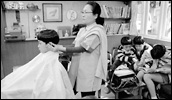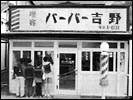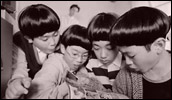Yoshino’s Barber Shop
- Year
- 2004
- Original title
- Baba Yoshino
- Japanese title
- バーバー吉野
- Director
- Cast
- Running time
- 96 minutes
- Published
- 28 June 2004



by Jasper Sharp
The village of Kaminoe is an idyllic haven of flower filled meadows and tranquil wooded glades surrounded by majestic towering peaks. Once a year, on Mountain Day, the local community gather in the fields to pray to the god of the mountain, with the ranks of local boys dressed in white choirboy smocks delivering an alfresco version of The Hallelujah Chorus against the cherry-blossomed backdrop as the highpoint of the celebrations. The tradition stretches back way into the hazy mists of time, though none of the locals can remember when.
The village has its other related traditions too, the most conspicuous being that all of the village boys are subjected to the same harsh, identikit bowl-shaped haircut administered by the scissor-fingered Yoshiko (Motai), the righteous guardian of local custom operating from her hereditary seat of power in the centre of the village, Yoshino's Barber Shop. No one quite remembers how, when or why the tradition first began. Grandpa Mikawa (Sakurai), who still puts in frequent appearances beneath Yoshiko's clippers recalls that the practice was originally intended as a ward against the malevolent, long-nosed, red-faced goblin known as the tengu - the common wisdom being that it is confused by the boys' identical hairdos.
None of this is any particular problem for the local elementary school kids, who, as children do, accept it as part of their daily life. Yoshiko's two sons, Keita (Yoneda) and Yaji (Okawa) are happy enough that Yoshino's Barber Shop serves as the social hub for the rest of their pudding-headed peers after school ends. So what if they are greeted with ridicule by the other kids during their occasional forays into the neighbouring villages?
Life is trotting along just fine until into this village idyll sashays new boy Yosuke Sagami (Ishida) sporting a trendy centre-parting and blonde highlights. Straight away Yosuke's presence threatens to disrupt the status quo as Keita and his cronies, who are just at that age where boys start noticing girls, find themselves sidelined from the attention of their female classmates by this exotic arrival from the big city. At the request of his teacher, the task of showing the new kid around the village falls to Keita. Their path inevitably takes them both into perilous vicinity of Yoshino's Barber Shop. Fortunately, Sagami-kun finds himself swept away by the gaggle of his new female admirers just before falling beneath Yoshiko's sheers.
As the days go by however, Yosuke finds himself increasingly under pressure at school to surrender to local custom. He soon takes to staying at home feigning sickness in order to avoid the standard issue haircut that the village authorities insist on. With the only other member of the community to have escaped Yoshiko's scissors so far being the local halfwit known to the villagers as Uncle Keke, who roams the village in a dress waving an umbrella, Yoshiko admonishes her two sons that Yosuke must be a bad kid for refusing to do what he is told.
Nevertheless, the newcomer's steadfast stance (not to mention the large collection of porn magazines filched from his dad's private supplies) soon begins to win over the local boys. As Yosuke tells them that "forcing everyone to have the same haircut is a violation of human rights", and he points out certain inconsistencies within the very religious foundations of their village traditions, Keita and Yaji soon find themselves wavering between their mother's harsh authority and the outsider's rebellious cool. The time looks ripe for revolution.
With her debut feature Naoko Ogigami (who also wrote the script) joins the ever-swelling numbers of accomplished women directors, including Naomi Kawase, Miwa Nishikawa (Wild Berries, Sway), and Yuki Tanada (Moon and Cherry, Ain't No Tomorrows), who have emerged within Japan over the past decade. Yoshino's Barber Shop won the 2004 Pia Film Festival Scholarship Award, which has previously gone to such crucial figures in the Japanese independent scene as Ryosuke Hashiguchi (A Touch of Fever, Like Grains of Sand), Kazuyoshi Kumakiri (Kichiku, Hole in the Sky) and Shinobu Yaguchi (Down the Drain, Swing Girls), as well as gaining a Special Mention at the 2004 Berlin International Film Festival.
A fresh and naturalistic coming-of-age movie with a sting in its tail, Yoshino's Barber Shop recalls the unforced, easy-going charm of works such as Shin Togashi's recent Gomen (2002) or, casting the net further afield, Rob Reiner's Stand By Me (1986). Its neat central concept is sure to strike chords of recognition with all former ugly ducklings everywhere who remember the days when a nerdy haircut represented the final hurdle into the realm of adulthood, and when cutting loose from mother's apron strings was a critical stage in the quest for an individual identity. Though the movie loses direction and wanders off the path slightly in the final quarter, the allegory of a community that uses the tools of dogma and tradition to keep its members permanently infantilised is always clear, if never overly stressed.
A great piece of independent filmmaking that actually has something to say, Yoshino's Barber Shop is the kind of low-key offering that, unfortunately, far too seldom makes it past the film festival circuit, with foreign distributors almost dogmatic in their insistence that the only thing audiences possibly look for in Japanese film is sadistic violence and perverted sex. Whimsical and endearing, this promising first feature is certainly universal enough to win over viewers all around the globe. Let's hope that it can find the audience it deserves.